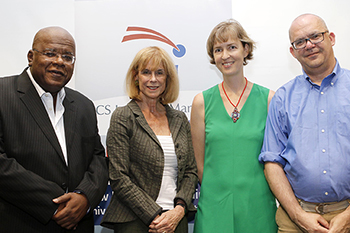Latest News Archive
Please select Category, Year, and then Month to display items
11 June 2021
|
Story Rulanzen Martin
|
Photo Courtesy of artists and the Johannes Stegmann Gallery.
![]()
Liminality is an exhibition of first-, second- and third-year student’s work in the
Department of Fine Arts at the University of the Free State (UFS). The works are from 2019 and 2020. Created during the hard lockdown of 2020, the artworks provide a glimpse of what students had to deal with and overcome during these times.
In a proposal for the exhibition, Angela de Jesus, Curator of the UFS Art Galleries, wrote: “The subtitle of the exhibition is ‘threshold, transition, transformation’ and it refers to the creative processes that students engaged with
in these adverse circumstances resulting in a wide array of artworks in both traditional and adapted mediums.”
The exhibition speaks to our shared experiences of insecurity, fragility, and discord, and to the resourcefulness and immutability of creative expression.
The virtual exhibition runs until 2 July 2021.
The exhibition is also currently available for viewing at the Johannes Stegmann Art Gallery, Sasol Library, UFS Bloemfontein Campus. Monday - Friday 09:00 - 16:00.
 MEGAN JOHNS, Battleground, Tobacco, charcoal dust, plaster of paris and resin, 93.5 x 50 x 7.5 cm
MEGAN JOHNS, Battleground, Tobacco, charcoal dust, plaster of paris and resin, 93.5 x 50 x 7.5 cm
 JACOBETH SELINGA, Linda, Installation: Found bed, wool and thread, 257 x 196 x 91 cm
JACOBETH SELINGA, Linda, Installation: Found bed, wool and thread, 257 x 196 x 91 cm
 POLOKO MOHANOE, Prayer for rain, Gouache on Fabriano, 66 x 72.8 cm
POLOKO MOHANOE, Prayer for rain, Gouache on Fabriano, 66 x 72.8 cm
 SEBOTSE SELAMULELA, In my image (Coronavirus head), Clay, 35 x 40 x 60 cm
SEBOTSE SELAMULELA, In my image (Coronavirus head), Clay, 35 x 40 x 60 cm
 WILLIAM SHAER, Creator, Deconstructed chair, koat wood and Imbura wood, 100 x 75 x 45 cm
WILLIAM SHAER, Creator, Deconstructed chair, koat wood and Imbura wood, 100 x 75 x 45 cm
 Johannes Stegmann Gallery
Johannes Stegmann Gallery
 Interior of the Johannes Stegmann Gallery
Interior of the Johannes Stegmann Gallery
UFS hosts first ACS Institute held on African soil
2015-12-08

The first ever Association for Cultural Studies (ACS) Institute hosted on the African continent is taking place on the Bloemfontein Campus. At the event are, from the left: Prof Jonathan Jansen, Vice-Chancellor and Rector of the UFS; Prof Jean Comaroff, Alfred North Whitehead Professor of African and African-American Studies and Anthropology at Harvard University; Prof Helene Strauss, Chair of the Department of English at the UFS; and Prof Gil Rodman, Chair of the Association for Cultural Studies and Professor of Communication Studies at the University of Minnesota.
Photo: Johan Roux
|
The University of the Free State (UFS) is hosting the 2015 conference of the Association for Cultural Studies (ACS) Institute – the first time for this international event to take place on the African continent.
From 7 – 12 December 2015, some of the world’s leading scholars in cultural studies are taking part in the conference on the Bloemfontein Campus. The event has been organised by the UFS Department of English in collaboration with colleagues from other departments in the Faculty of the Humanities.
The ACS is the foremost international association for scholars in cultural studies, and has been hosting the biennial Crossroads in Cultural Studies Conference since 2006. In 2011, the ACS held its inaugural institute at the University of Ghent (Belgium), followed, in 2013, by one at the Alpen-Adria University Klagenfurt (Austria). As the 2015 meeting of the institute is the first to be held in Africa, the organisers aim at highlighting the contributions that scholars from our continent and other (post)colonial contexts have made to cultural studies, even as it engaged many of the long-standing theoretical concerns generated for the field by scholars from the Global North.
Themed ‘Precarious Futures’, the conference explores how cultural studies might assist in charting more equitable futures by reflecting critically on the cultural, economic, and political trajectories within which precariousness – a state increasingly anticipated for the planet – might be altered. Experts in a diversity of disciplines are sharing their perspectives in the form of seminars and lectures.
Keynote lectures are delivered by Prof Jean Comaroff (Harvard University), Prof John Erni (Hong Kong Baptist University), Dr Jo Littler (City University London), Dr Zethu Matebeni (University of Cape Town), and Prof Handel Kashope Wright (University of British Columbia).
In her opening lecture on Monday 7 December 2015, Prof Comaroff addressed the challenging relationship of law, detection, and sovereignty in contemporary African polities within the South African post-apartheid context.
Topics discussed include climate change; the archives of everyday life; cross-racial intimacies; ethnography; meritocracy; cultural studies and human rights; China and globalisation; gender, sexuality, and race; and governance, embodiment and the work of care.